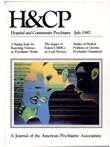Medical Care of Chronic Psychiatric Outpatients
Abstract
Chronic psychiatric patients often fail to receive adequate general medical care. In a study of 42 outpatients in a psychosocial rehabilitation program, 93 percent were found to have at least one problem warranting assessment, treatment, or follow-up. Minor gynecologic disease was the most common problem among women and gross dental disease among men. Only 11 percent of the men's and 26 percent of the women's problems were receiving appropriate care. Seventy-seven percent of the previously unrecognized problems were found just by routine physical examination and hematocrit determination. Medical care for chronic psychiatric patients would improve if psychiatric clinics provided simple medical screening and if therapists were aware of their patients' general health needs.
Access content
To read the fulltext, please use one of the options below to sign in or purchase access.- Personal login
- Institutional Login
- Sign in via OpenAthens
- Register for access
-
Please login/register if you wish to pair your device and check access availability.
Not a subscriber?
PsychiatryOnline subscription options offer access to the DSM-5 library, books, journals, CME, and patient resources. This all-in-one virtual library provides psychiatrists and mental health professionals with key resources for diagnosis, treatment, research, and professional development.
Need more help? PsychiatryOnline Customer Service may be reached by emailing [email protected] or by calling 800-368-5777 (in the U.S.) or 703-907-7322 (outside the U.S.).



